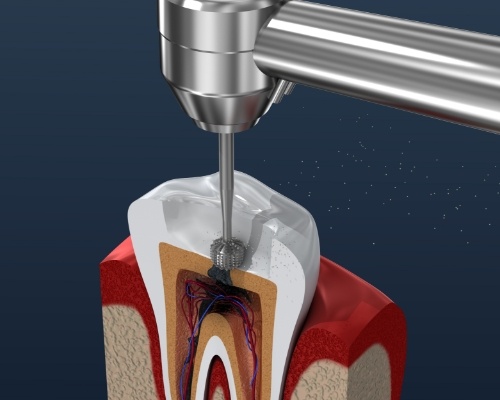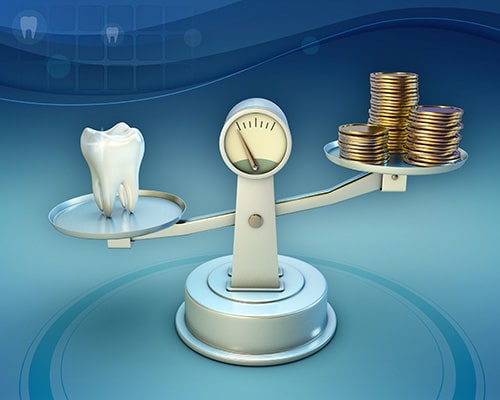Root Canal Treatment – Jenks, OK
Taking Away Your Tooth Pain for Good
Root canal treatment often gets a bad reputation. With the misconception that it causes pain, you might assume it’s simply better to just have the tooth removed. However, this is not true. First, a root canal doesn’t cause pain; it removes it. Second, keeping your natural teeth as long as possible is the best solution. At Elwood Avenue Dental, our talented dentists are trained to perform root canal treatment so that you can enjoy your natural smile for years to come. Also, we can provide pulp therapy for children who may have damaged or decayed dental pulp. If you want to learn more, call us to schedule an appointment or read on!
Why Choose Elwood Avenue Dental for Root Canal Treatment?
- Sedation Dentistry Available
- Pulp Therapy for Children
- Caring & Patient-Focused Dental Team
Do I Need Root Canal Treatment?

The presence of any abnormal dental symptoms – no matter how minor they may seem – warrants a call to our Jenks dental team. We especially recommend reaching out to us if you’re experiencing a sharp, stabbing pain when you bite down, dental sensitivity even when your teeth and gums haven’t been exposed to hot/cold stimuli, or a dull, consistent discomfort. These are all warning signs of significant decay or a serious infection, and we want to pinpoint the best treatment ASAP.
The Root Canal Process

We will start the root canal treatment process by administering local anesthesia. Once you are numb, we will isolate the tooth using a dental dam. Then, we’ll make a small hole in the crown of the tooth to access the interior, which we will then clean out as we make our way to the pulp. When reaching the area causing the pain, we will remove the infected or damaged pulp as well as clear out any existing canals. The tooth will then be filled with a biocompatible solution before a customized dental crown is created and secured over it.
The Benefits of Getting a Root Canal

Over the years, you may have heard lots of rumors about root canal treatment, including that it’s painful or that it’s best to get your tooth extracted. That’s far from the truth! Since your mouth will be numbed beforehand, you won’t feel any discomfort during the treatment process. Furthermore, tooth extractions are reserved for particularly dire cases, like when the tooth is damaged to the point where it can no longer be saved. It’s also worth noting that the restorations used today don’t draw any unwanted attention to your smile since they are custom-made from only the best dental materials, ensuring they look and feel just like the real thing.
If you’re in pain, or you’re experiencing another abnormal dental symptom, like dark discoloration on your tooth, don’t hesitate to get in touch with our emergency dentist to schedule an exam. If a root canal is necessary, you can have peace of mind knowing we will go the extra mile to ensure the entire process is as painless and quick as possible.
Understanding the Cost of Root Canals

If you have an infected tooth, we may be able to save it with root canal treatment. However, many patients worry about the cost. During your appointment with us, we will go over the cost of your treatment in detail so you don’t run into any surprises. Until then, here are some things to keep in mind.
Factors That Can Affect Root Canal Cost

We won’t be able to determine the exact cost of your root canal treatment until you see us in person. This is because multiple factors contribute. Here are the most prominent ones:
- Location: Depending on where the affected tooth is located, the cost will vary. Molars have more roots than teeth in the front of the mouth, so they take longer to treat.
- Difficulty: The more complicated a procedure is, the higher the cost.
- Additional Treatments: Sometimes patients need another service, like a dental crown, along with their root canal. This cost should be considered as well.
Is It Cheaper to Pull My Tooth?

Many people feel tempted to skip the whole root canal process and just have their troublesome tooth extracted. However, this generally isn’t the best option. The cost of a tooth extraction may be less upfront, but you need to consider the long-term consequences of losing one of your natural teeth. After an extraction, your bite can become negatively impacted as the surrounding teeth shift out of place to fill in the gap. This results in difficulty chewing and general discomfort. To prevent this, you would need to replace your missing tooth with a dental bridge or dental implant. The cost of these tooth replacement options can add up quickly. Ultimately, a root canal is the most cost-effective way to address an infected tooth in the long term. Remember that you shouldn’t put off a root canal either. If you wait too long, your tooth may no longer be salvageable.
Does Dental Insurance Cover Root Canal Treatment?

In the majority of cases, root canal treatment is considered to be a “major restorative treatment.” Most dental insurance plans cover this tier of service at approximately 50%. Just keep in mind that every plan is different, so it is best to double-check with your dental insurance provider so that you don’t run into any surprises. At Elwood Avenue Dental, we are proud to be in-network with Delta Dental Premier, Principal, Ameritas, UnitedHealthcare, Humana, and a few other common PPO dental insurance plans. We can answer questions about your coverage and handle the entire claims process. If you have any questions or concerns, don’t hesitate to contact one of our friendly team members.
Other Options for Making Root Canal Treatment Affordable

If you don’t have dental insurance, this doesn’t necessarily mean that you will be left completely on your own. We are happy to accept payments through CareCredit – a third-party financing company that can split the cost of your treatment into manageable monthly installments with little to no interest. Signing up and being approved only takes a few minutes. Let us know if you need any assistance with this process.
Root Canal FAQs
Are Root Canals Painful?
This is the most asked question about root canals. It’s not surprising since the reputation behind this emergency dental service isn’t the best. The reality is that your mouth will be thoroughly numbed beforehand. Plus, this treatment is designed to eliminate the infection, alleviating any pain you’re feeling in the process. In other words, you don’t have to worry – the process of restoring the look, health, and function of your tooth won’t hurt.
Can I Take Antibiotics Instead of Getting a Root Canal?
Although antibiotics are sometimes used in tandem with root canal treatment, they are not a suitable replacement. After all, the medication travels through the bloodstream, and your bloodstream doesn’t reach the pulp of your tooth (which is where the infection lies). That’s why the only option – outside of a tooth extraction – is a root canal.
Can Root Canals Be Prevented?
If you want to avoid ever needing a root canal, we have good news: they are largely preventable! The key is to take great care of your oral health by brushing, flossing, and rinsing with mouthwash consistently. You should also adopt other good habits, like visiting us twice a year for a checkup and cleaning as well as wearing a mouthguard during sports to prevent cracks in your enamel.
Why Do I Need a Root Canal if My Tooth Doesn’t Hurt?
Since severely decayed and infected teeth often hurt, patients are usually a bit confused as to why they need a root canal if they aren’t experiencing any pain. In short, there are several warning signs of dental damage, not just one. During your routine exams, our dental team near Jenks looks for dark discoloration, inflamed gums, and other indicators that something is wrong. In addition to sharing our findings with you, we will share our treatment recommendations and why it’s so important to schedule your next appointment – even if the situation doesn’t feel urgent.
How Much Pain is Normal After a Root Canal?
Your mouth will be thoroughly numbed before we treat your tooth, so you won’t feel any pain or discomfort in the treatment chair. A few hours after you return home, the numbing agent will begin to wear off, causing some soreness and sensitivity to surface. This is completely normal, and, fortunately, can be alleviated with a few simple steps. The first is taking OTC pain medication as directed. The second is sticking to soft foods that aren’t too hot or cold, like plain yogurt. The third is rinsing periodically with warm saltwater.
Are Root Canals Covered by Insurance?
You’ll be happy to hear that, in addition to covering preventive care, many dental insurance providers cover a portion of the cost of essential restorative treatments. That said, there is some red tape that needs to be considered, like annual maximums, so you should take the time to read through the fine print on your plan. If you need any assistance, then let us know! We’re proud to be in-network with Delta Dental Premier, Principal, Ameritas, and several other popular providers.

